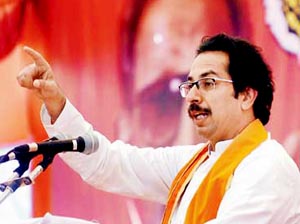Mumbai, Jun 11: Hitting back at NCP leader Sharad Pawar who blamed BJP's rise for the recent mob violence in Pune which left an IT professional dead, Shiv Sena chief Uddhav Thackeray today equated him with JuD chief Hafiz Saeed and said he has "lost his sense of proportion" after the poll debacle.
"Pawar is speaking like Hafeez Saeed. After the violence following objectionable posts in social media, Pawar said such forces have raised their head after (Narendra) Modi government came to power.
"It is difficult to predict what Pawar will say and when. His sense of proportion has gone for a toss after his party's debacle in Lok Sabha polls," Uddhav said in an editorial in Sena mouthpiece Saamana.
"There was one murder (Pune techie killing) in Maharashtra. What has the Modi government got to do with it?" Uddhav wondered.
"Pawar should know that Modi government was not in power when (Ajmal) Kasab and others attacked Mumbai," he said.
Uddhav claimed that NCP minister Jitendra Awhad who is close to Pawar, doesn't allow police to act against goons in Mumbra-Kalwa area in Thane as the culprits belong to a specific religious community.
On Saeed blaming Modi for the Karachi airport attack, Uddhav said he should remember that Tehrik-e-Taliban has claimed responsibility for it.
In a veiled attack on the Centre's ruling party, Pawar had on Sunday said "communal fever" was spreading after BJP came to power.
"Fifteen days have passed since BJP came to power with absolute majority and a communal fever is spreading. Communal violence rocked some places in the state and a young professional was killed," Pawar told a meeting of NCP workers, while referring to the killing of techie Mohsin Shaikh at Pune last week allegedly by rightwing Hindu Rashtra Sena.
"This has not happened before. Certain ideologies which were lying low all these years are now raising their heads and some sections of the society are living in fear," he had said.





Comments
Add new comment